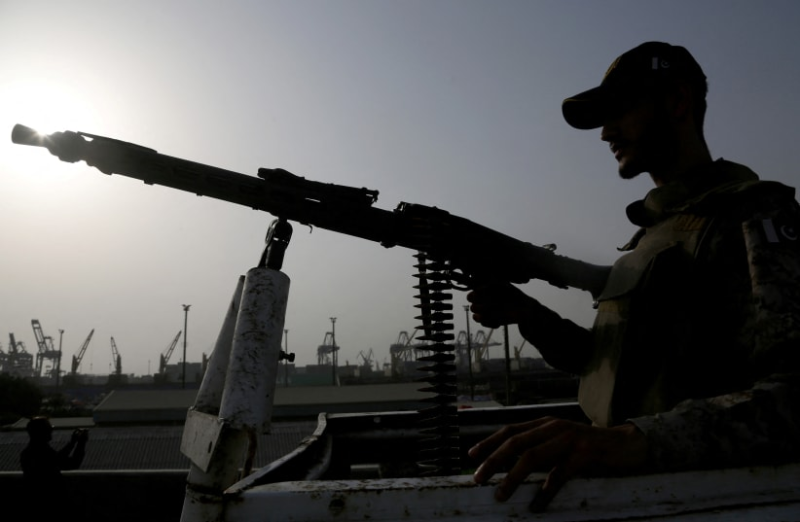- Israel Strikes Tehran with US Support Amid Nuclear Tensions |
- India Sees 9% Drop in Foreign Tourists as Bangladesh Visits Plunge |
- Dhaka Urges Restraint in Pakistan-Afghan War |
- Guterres Urges Action on Safe Migration Pact |
- OpenAI Raises $110B in Amazon-Led Funding |
Pakistan launches military offensive against India amid clashes

A paramilitary trooper mans a gun atop a vehicle as he keeps guard during a media tour of the Karachi Port, Pakistan, May 9, 2025.
Pakistan has confirmed the launch of a military operation against India early on Saturday, targeting several bases, including a missile storage facility in northern India, as hostilities between the two nuclear-armed nations reached a peak not seen in nearly 30 years.
Pakistan’s military said the offensive came after India fired missiles at three air bases, including one near the capital Islamabad. Pakistani air defences reportedly intercepted most of the incoming missiles.
The escalating conflict began on Wednesday when India launched airstrikes against what it termed "terrorist infrastructure" inside Pakistan. Pakistan responded by vowing to retaliate. Since then, the two countries have been engaged in daily clashes.
Pakistan’s military claimed it successfully struck key Indian military sites, including the BrahMos missile storage facility in Beas, and airfields in Pathankot and Udhampur. The military’s statement indicated that the operation was aimed at weakening India’s military capabilities, particularly missile storage and air bases used for strikes against Pakistan.
India's military and government have not yet commented outside regular business hours, though a statement from India's Ministry of Defence indicated a media briefing was expected soon.
The Pakistani military operation has been dubbed "Operation Bunyanun Marsoos," a term taken from the Koran meaning a "firm, united structure." The operation is being carried out with measures to avoid civilian casualties, according to Pakistan's planning minister.
Pakistan’s National Command Authority, which oversees decisions on the country’s nuclear arsenal, has convened a meeting to review the situation.
Explosions were reported in Indian Kashmir, particularly in Srinagar and Jammu, where air-raid sirens were activated. Indian Kashmir’s Chief Minister Omar Abdullah confirmed that one official was killed by shelling in Rajouri, close to the Line of Control dividing the contested region.
Pakistan's military spokesman, Lieutenant General Ahmed Sharif Chaudhry, stated that the airstrikes by India targeted bases such as Nur Khan, Mureed, and Shorkot, while Pakistan’s air defences intercepted most of the incoming missiles. Early assessments suggest that while some missiles breached defences, they did not hit any critical air assets.
India's strikes on Wednesday were in retaliation for an attack on Hindu tourists in Indian Kashmir the previous month, which India blamed on Pakistani militants. Pakistan denied involvement in the attack.
Since the onset of hostilities, both countries have exchanged cross-border fire, shelling, and drone and missile attacks. Fighting has been particularly intense in Indian Kashmir and areas near the Pakistan-India border. India claims it shot down Pakistani drones.
The Group of Seven (G7) nations have called for maximum restraint from both India and Pakistan and urged direct dialogue to resolve the conflict. The UK’s High Commissioner to Pakistan, Jane Marriott, expressed concern and emphasized close monitoring of the developments.
The violence has spread to several cities in both countries, including Lahore and Peshawar in Pakistan, as the conflict escalates. Casualty estimates have reached at least 48 people, though the figures have not been independently verified.

